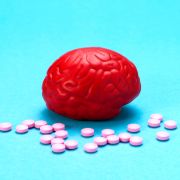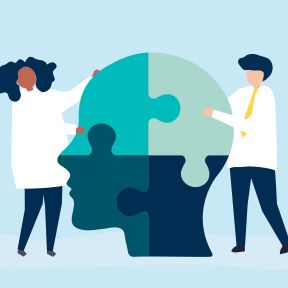Selective serotonin reuptake inhibitors (SSRIs) are a class of antidepressant medication prescribed for treatment of a range of psychiatric disorders. They are most often used for depression but are also widely prescribed to help manage symptoms of anxiety and anxiety-related disorders, including generalized anxiety, social anxiety, obsessive-compulsive disorder and post-traumatic stress disorder (PTSD). The prototype drug in this group is fluoxetine, best known by its trade name, Prozac.
Contents

SSRI is short for selective serotonin reuptake inhibitor. The SSRIs are a group of related chemical compounds that increase the amount of the neurotransmitter serotonin in the brain. Neurotransmitters ferry signals from one nerve cell to the next across a juncture known as the synapse. After relaying a message across the synapse, a neurotransmitter generally gets reabsorbed by the nerve cells, a process known as “reuptake.” SSRIs inhibit the absorption process, resulting in higher serotonin levels. The increased availability of serotonin at synapses facilitates the transmission of nerve signals involved in regulating mood, appetite, biorhythms, and overall well-being.
The first major SSRI to be introduced to the general public was fluoxetine, widely known by its trade name, Prozac, in 1987. More than three decades later, Prozac remains one of the most popular SSRIs and is the 19th most prescribed drug in America. Other SSRIs include sertraline (Zoloft), citalopram (Celexa), paroxetine (Paxil, Brisdelle, Pexeva), escitalopram (Lexapro), fluvoxamine (Luvox), and vilazodone (Viibryd). They differ from Prozac slightly in chemical structure and therefore in the specific symptoms they target and their possible side effects; for example, the SSRI bupropion (Wellbutrin) is sometimes used to help people stop smoking.
Drugs like penicillin changed the course of human history, providing a cure for infections that ravaged populations around the globe, but Prozac may be the first drug to ever become a cultural celebrity. In 1993, psychiatrist Peter Kramer wrote Listening to Prozac, claiming that the drug didn’t just cure depression but changed personality. The book became a blockbuster bestseller and inspired many other books about the drug and its uses, but its most enduring contribution may have been to widen the public discussion of mental health conditions and reduce the stigma attached to them.
Although SSRIs are primarily used to treat depression, they are commonly prescribed for the treatment of anxiety and related conditions. They have also been used to treat impulse-related disorders like trichotillomania (hair-pulling disorder), although evidence of their efficacy for such conditions is mixed, and they are generally not a first-line treatment. They are also used to treat eating disorders, including anorexia.
Popular SSRI antidepressants include sertraline (Zoloft), fluoxetine (Prozac, Sarafem), citalopram (Celexa), paroxetine (Paxil, Brisdelle, Pexeva), escitalopram (Lexapro), fluvoxamine (Luvox), and vilazodone (Viibryd). In addition to depression, the SSRIs are frequently prescribed to treat panic attacks, PTSD, OCD, and social anxiety.
In many cases, a process of trial and error is required to find an antidepressant that works and has a tolerable profile of side effects. It may take trials of several drugs, alone or in combination, before a patient sees any results. It can take at least a month before a person notices improvement in mood from any one drug.

Exactly how the SSRIs counter depression has never been clear. Despite all the books and attention that SSRIs get, the drugs fully relieve depression in only a third of patients. SSRIs do not work at all in a full third of patients and provide only partial relief of symptoms in another third of patients.
The belief that depression is a chemical imbalance caused by low serotonin levels has become widely accepted, despite there being no evidence for it. The increase in neurotransmitter levels attributed to SSRIs may contribute to depression relief, but it is not considered the main source of improvement. One reason is that the neurotransmitter changes happen immediately, but the drugs can take six weeks or more to provide relief of symptoms. Researchers believe that the time lag is due to the development of new nerve cell connections—neuroplasticity—which pave the way for mental and behavioral flexibility.
The monoamine theory of depression has long been influential. It holds that depression results from a deficit of one or more neurotransmitters in the brain. It links the neurotransmitters to specific groups of symptoms. For example, serotonin-dependent signals affect sleep, digestion, mood, and behavior regulation; norepinephrine drives the fight-flight-freeze response; and dopamine has been linked to motivation, movement, and the capacity for pleasure. However, the notion that a chemical imbalance in the brain generates depression has given way to newer ideas that reflect a greater understanding of how the brain works.
Reuptake inhibitors bond to the transporter molecules that typically chaperone neurotransmitters across the synapse. By taking up the space that the neurotransmitter usually occupies on the transporter, and preventing the neurotransmitter from being retired from active duty, reuptake inhibitors increase levels of the neurotransmitter available at the synapse. The higher level of neurotransmitter is thought to strengthen nerve signals.
Modern thinking suggests that depression is a problem of circuitry, not chemistry. In this view, symptoms of depression result from failure of synapse formation and changes in the activity level of various emotional signaling centers, set in motion by overactivity of the stress response system, often in response to early adverse experience. Mental health conditions such as depression and anxiety can be seen as “aversive yet adaptive responses to adversity.”

Depression is an extraordinarily complex condition involving multiple brain and body functions and basic appetite for life itself. Due to changes in the activity level of various emotional signaling centers, the brain becomes extremely biased toward negative thoughts and feelings and easily overwhelmed by them. The ability to enjoy life vanishes. Motivation flees with it. Physical movement becomes difficult. Sleep is disturbed. It is a notoriously difficult illness to treat. Talk therapy not only provides symptomatic relief but improves brain function as well. Yet it is not always enough—or fast enough.
From the beginning, there have been questions about the effectiveness of SSRIs. A large meta-analysis recently published in The Lancet found that, overall, all SSRIs and SNRIs were more effective than placebo in treating adults with major depression. However, many well-known SSRIs are ineffective for as many as 30 percent of people who try them.
The successful treatment of depression is important. The longer that depression episodes last and the more episodes that occur, the more that depression changes the brain and becomes a chronic condition and a source of psychic pain. Patients who are prescribed an SSRI that doesn’t manage their symptoms well often feel discouraged or unwilling to try another option, further complicating their treatment prospects.
According to a six-year meta-analysis, SSRIs were more efficacious than placebos in adults with depression when judged by two criteria: efficacy (response rate) and acceptability (measured by whether treatment was discontinued for any reason). The efficacy of a given SSRI across thousands of studies varies significantly, ranging anywhere from about one-third as effective to twice as effective as a placebo, but the effect sizes were generally modest. Studies consistently show that antidepressants work best in conjunction with therapies like cognitive-behavioral therapy (CBT).
Approximately four to six weeks after treatment begins, patients who are responding to SSRIs notice that they have more energy, are less anxious, and feel less hopeless about the future. If a patient has not shown such improvement after six weeks, it’s likely that their doctor will recommend trying another antidepressant.
Since symptoms targeted by SSRIs are primarily psychological, changes tend to be subtle and may not progress in a linear manner. In cases of depression, non-mood-related symptoms—such as insomnia or mental slowness—may improve first, often within three weeks of beginning treatment. Studies show that most patients who eventually see improvements in mood first report gains in cognition. As a result, changes in cognition may be one way to better predict whether an antidepressant will work for a patient.
SSRIs fail to treat depression in approximately one-third of all depressed patients. These individuals may continue to suffer from lingering symptoms, such as fatigue, pain, insomnia, trouble concentrating, and lack of enjoyment. The brain is complicated, and science doesn’t fully understand all of the mechanisms of depression. Keep in mind that while SSRIs can be helpful, they are by no means the only method of treating depression, anxiety, and other psychiatric conditions.
SSRIs are popular, because they tend to have fewer risks and side effects than earlier medications. Most doctors prescribe low doses of SSRIs and then increase the dosage slowly as the brain adjusts to the new levels of serotonin available. Especially when used in conjunction with talk therapy and exercise, SSRIs can be an effective way to treat depression.

Although the class of drugs was developed in the hopes of eliminating some of the unpleasant (and dangerous) side effects of earlier types of antidepressants, side effects nevertheless accompany SSRI usage. Some, like an increased risk of suicidal ideation in children and adolescents or cardiac arrest in adults, are very serious, while others, like dry mouth or sexual dysfunction, can be troublesome but not life-threatening. Because of their side effects, however—as well as their inconsistent results in treating depression—they continue to generate controversy. Like most antidepressants, SSRIs appear to be most effective when used in combination with cognitive-behavioral therapy or other forms of therapy.
When used correctly, SSRIs can help relieve depression and anxiety, but don’t cause massive personality shifts. If someone feels emotionally flat or not like themselves on an antidepressant, this is considered an adverse side effect, and they may want to consult their physician about switching medications. When SSRIs work properly, patients report a decrease in negative rumination and better overall functioning. Patients might experience temporary withdrawal symptoms, such as increased depression, anxiety, and anger, when stopping an SSRI that should be discussed with their overseeing physician.
Approximately 70 percent of people taking SSRIs experience some form of sexual dysfunction, including the loss of orgasm. Even as SSRIs increase serotonin levels, they have a dampening effect on the neurotransmitter dopamine, which is associated with the elation of falling in love. Patients should be aware of the potential for some SSRIs to cause problems with sexual desire and performance. In some cases, these issues can be addressed by changing antidepressants, lowering the dosage, or taking a brief, physician-directed medication hiatus
Taking antidepressants has been linked to significant weight gain. Individuals who are already overweight are more likely to experience this generally undesirable side effect. Paxil and Lexapro are especially known to contribute to weight gain. Switching medications to avoid or reduce unwanted weight gain may be an option for some patients.
Patients taking an SSRI antidepressant are advised to gradually taper down the dosage rather than stopping cold turkey. Their neurons have grown accustomed to having a certain amount of serotonin available; if that level of serotonin is suddenly diminished, patients may suffer negative side effects, such as depression, anxiety, and flu-like symptoms.
Serotonin syndrome usually occurs when a patient takes two or more serotonin-related drugs. Symptoms can include dilated pupils, loss of coordination, muscle weakness or rigidity, agitation, or rapid heart rate. Anyone who experiences any of such symptoms after starting a new SSRI antidepressant is advised to seek medical attention immediately.

Despite their popularity, SSRIs have been the subject of controversy from the beginning. Many people are skeptical about how effective they truly are and how much they cost. Concerns have arisen about serious side effects, like an increase in suicidal thoughts or the potential for causing harm to the fetus during pregnancy.
When all the results of drug trials are examined in aggregate, SSRIs prove to be modestly more effective than a placebo for approximately one-third of the individuals who try them. Plus, it often takes experimenting with a few different types of SSRIs before finding the one that alleviates symptoms.
Despite the rapid rise in use of SSRIs, their use in young people has raised many questions. After examining the results of a 2004 study, the FDA mandated that drug manufacturers include a black box warning that the antidepressants can increase suicidal thoughts and behavior in children and teens. Critics of the black box warning argue that it scares parents and youths away from potentially helpful treatments. In fact, not enough is known about the way the drugs affect children’s bodies versus adults’ to make them a first-choice treatment. Some experts also worry about the overprescribing of SSRIs when normal sadness gets mistaken for depression.
SSRIs have long been controversial because they reflect a theory of depression causation that is a longstanding source of debate. While the chemical imbalance theory has been largely superseded, serotonin levels may still play a role in increasing a person’s risk for depression. Low serotonin levels have been linked to increased inflammation. High levels of inflammatory biomarkers are commonly found in depressed patients, suggestion a relationship between serotonin, inflammation, and depressive symptoms, even if the exact details remain unclear.















